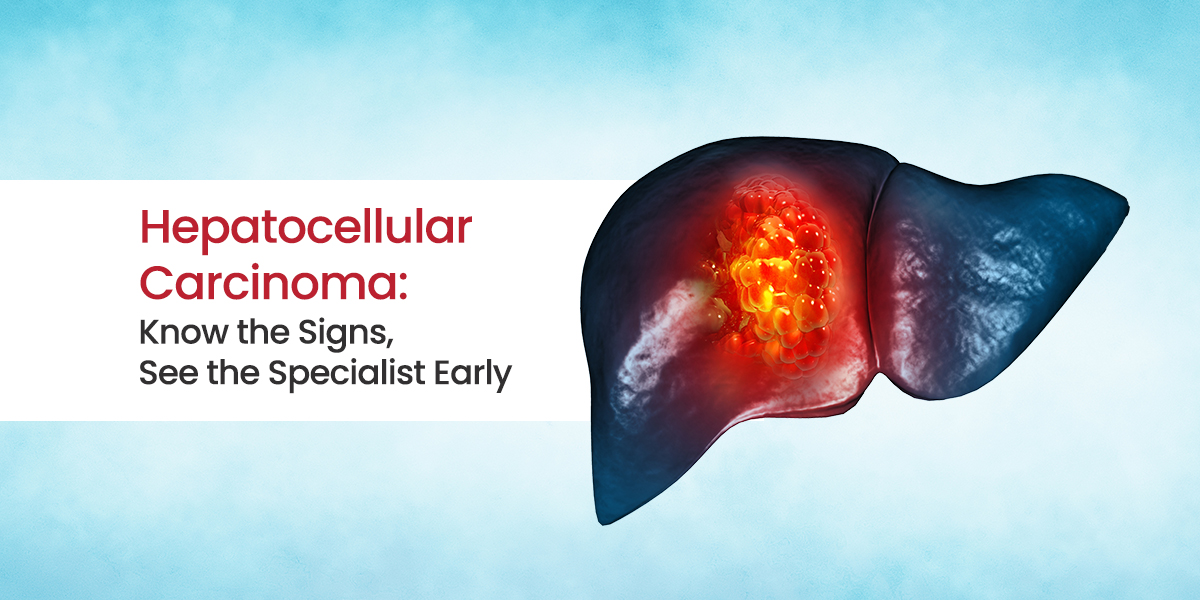Hepatocellular Carcinoma Symptoms: When to See a Liver Specialist

Hepatocellular Carcinoma (HCC) is the most common type of primary liver cancer, often developing in individuals with chronic liver disease or cirrhosis. It is responsible for almost 75-85% of all cases of liver cancer worldwide. Liver cancer is the sixth most diagnosed cancer and the third most fatal cancer-related cause of death internationally, as estimated by the World Health Organization (WHO). Early detection and prompt treatment of the disease can significantly enhance the chances of survival, so awareness of its symptoms is crucial.
What is Hepatocellular Carcinoma?
Before learning about the symptoms, one should familiarize oneself with the meaning of hepatocellular carcinoma:
- A cancerous tumor that forms from hepatocytes, the primary functional cells of the liver.
- It usually occurs in the background of chronic liver damage due to hepatitis B or C infections, heavy alcohol consumption, or non-alcoholic fatty liver disease (NAFLD).
- It is frequently associated with liver scarring (cirrhosis).
- It is diagnosed through imaging techniques such as ultrasound, CT, or MRI, along with blood tests and, if necessary, a biopsy.
Chronic damage to liver cells over decades raises the risk for mutations to cause hepatocellular carcinoma.
Symptoms of Hepatocellular Carcinoma
Hepatocellular carcinoma symptoms aren’t very noticeable in the initial stage. As the condition worsens, it can cause:
- Unexplained weight loss without any change in diet.
- Persistent upper right abdominal pain due to the expansion of the tumor, straining the liver capsule.
- Loss of appetite and feeling full quickly.
- Jaundice (yellowing of the eyes and skin).
- Abdominal swelling (ascites) due to the accumulation of fluid.
- Persistent weakness and fatigue.
- Nausea and vomiting without any other illness.
These symptoms can overlap with other liver conditions; therefore, if recurring signs are observed, a medical assessment should be sought.
When to See a Liver Specialist
Seek a doctor immediately if you have:
- Abdominal pain lasting over two weeks.
- Unexplained jaundice.
- Sudden, unplanned weight loss.
- A history of hepatitis B, hepatitis C, or cirrhosis with new gastrointestinal symptoms.
Specialized centers, some providing gastrointestinal surgery in Kanpur, offer advanced evaluation and treatment of liver tumors.
Risk Factors Requiring Early Screening
Certain individuals are at a higher risk of developing hepatocellular carcinoma and should be screened regularly. One could be at a higher risk if they have:
- Chronic hepatitis B or C infection.
- Alcohol-related liver damage.
- Non-alcoholic fatty liver disease.
- Cirrhosis of any cause.
- Family history of liver cancer.
- Long-term exposure to aflatoxins.
Treatment Options for Hepatocellular Carcinoma
Treatment of hepatocellular carcinoma varies based on tumor size, number of lesions, and liver health. Treatment options include:
- Surgical resection: Removing the affected part of the liver, so that the remaining part remains healthy.
- Liver transplantation: Changing the damaged liver with a new one addresses both the cancer and the liver failure.
- Ablation therapies: In smaller tumors, heat, cold, or chemicals usually destroy the cancer cells.
- Transarterial chemoembolization (TACE): Blocks the blood supply to the tumor and delivers chemotherapy directly to it.
- Targeted drug therapy: Blocks the pathways promoting cancer growth.
- Immunotherapy: Aids the body’s immune system in attacking cancer cells.
Those who are treated surgically when their cancers are at an early stage tend to have better survival rates.
Prognosis and Recovery
Prognosis refers to the probable course of a disease, a physician’s estimation of how the condition will develop, and the possibility of recovery or survival. Prognosis is based on how early the diagnosis was made.
- Early stage + healthy liver: Optimal prognosis with possibility of cure.
- Advanced stage: Emphasizes slowing the rate of tumor growth and improving quality of life.
The recovery periods vary, depending on what they have been treated with. Those who undergo surgery can resume normal work in weeks, while transplant recipients take longer to recover.
Common Myths About Hepatocellular Carcinoma
These are some of the myths dispelled:
- Myth: Only heavy drinkers develop liver cancer.
Fact: While alcohol is damaging, hepatitis infections, fatty liver disease, and other conditions may also cause hepatocellular carcinoma.
- Myth: Liver cancer is untreatable.
Fact: Early-stage hepatocellular carcinoma can often be successfully treated with surgery, transplantation, or targeted therapy.
Preventive Measures
Prevention of the disease is not always possible, but risk can be minimized by:
- Being vaccinated against hepatitis B.
- Early treatment of hepatitis C.
- Reducing alcohol consumption.
- Keeping a healthy diet and weight.
- Steering clear of mold-infested foods to avert aflatoxin exposure.
- Diabetes and obesity management.
Conclusion
Hepatocellular carcinoma is a dangerous but controllable cancer if diagnosed early. Recognizing the symptoms and exploring the appropriate treatments for hepatocellular carcinoma can make a big difference. Regular screening is a lifesaver for those who are at high risk.
Also Read: Liver Cleanse: 10 Easy Ways to Detox your Liver

 Call-an-Ambulance
Call-an-Ambulance



